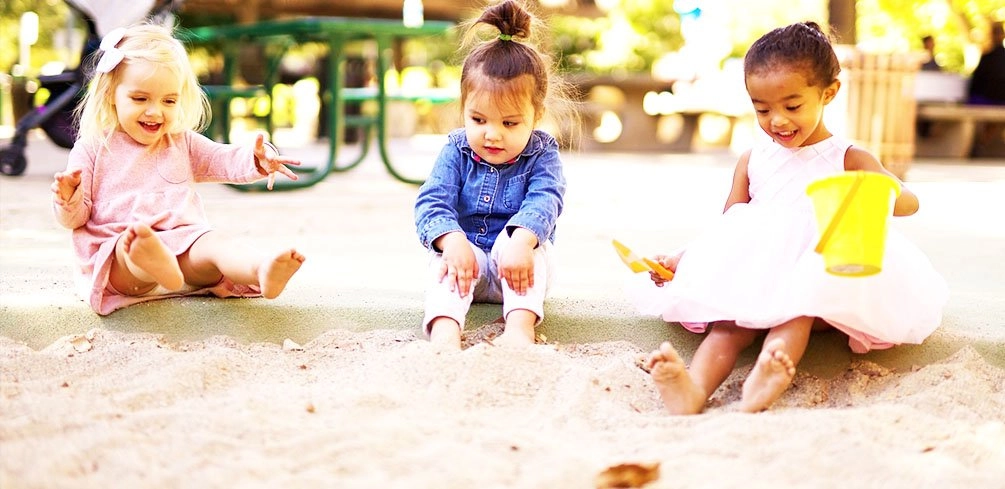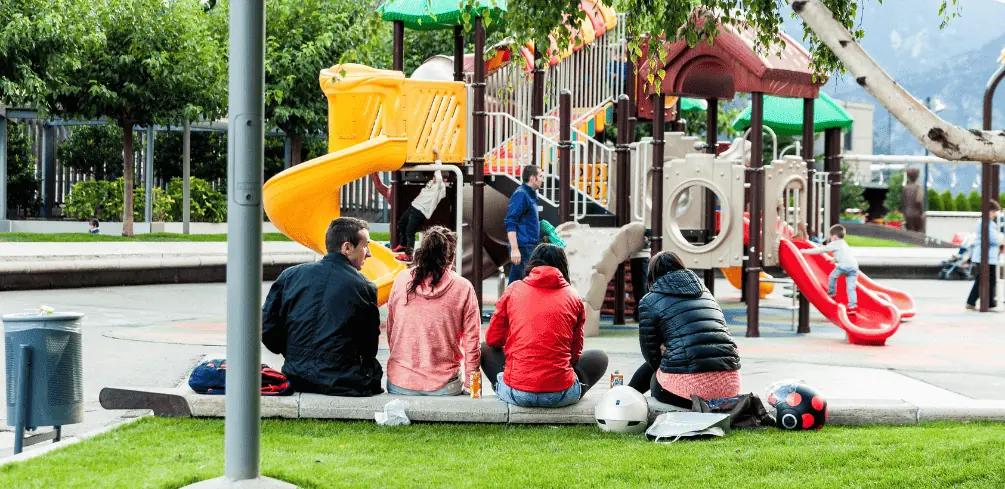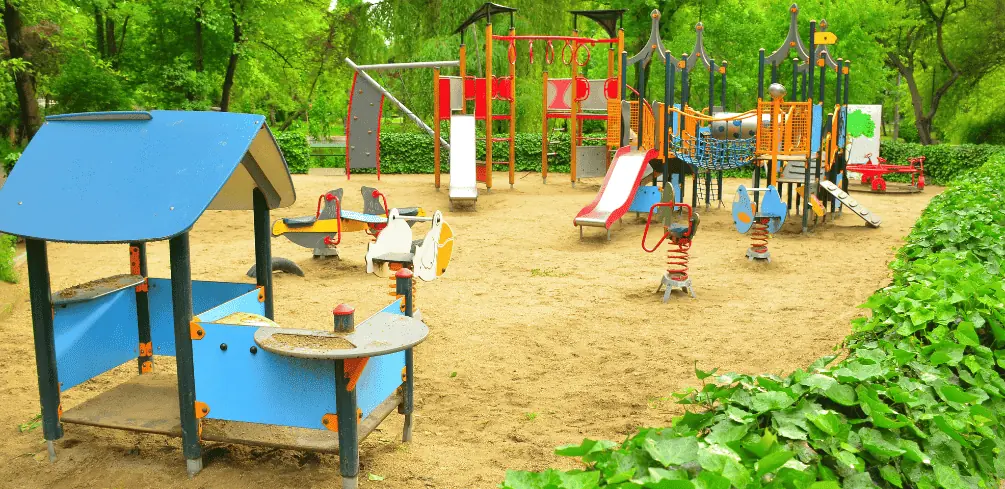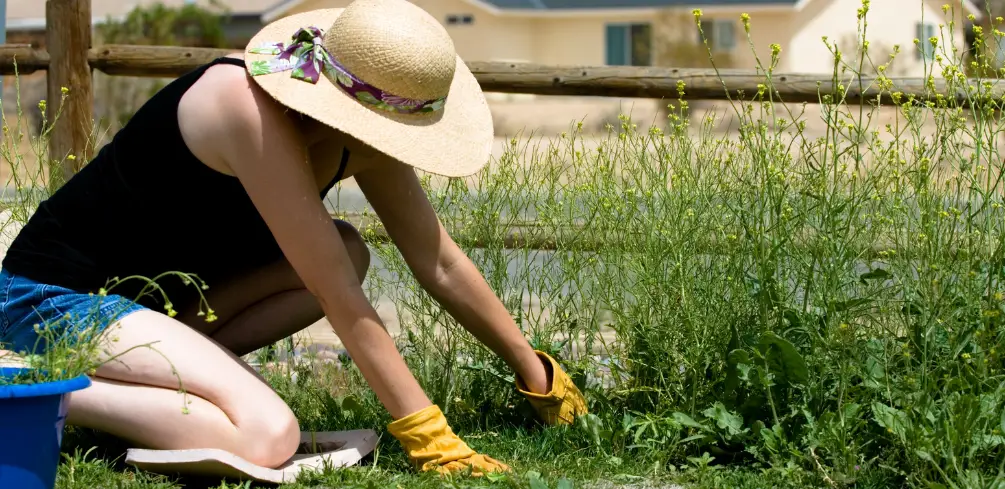The benefits of playgrounds include self-confidence, self-esteem, and self-control. Social skills are developed through group play. Playgrounds are safe environments that the kids can learn and play freely. More positives about playgrounds are physical activity, motor skills, and imagination. Children can take in nature without any screen distractions while engaging with their parents for quality family time.
Playgrounds are important for a variety of reasons. Playgrounds provide children with physical activities, motor skills, and opportunities for social interaction. But they don’t stop there!
Playgrounds also help to promote the development of cognitive abilities, communication, and creativity in children. These are just a few of the many benefits that playgrounds provide.
In this blog post, we will be discussing how you can maximize those benefits of play by making sure your playground is safe and fun for all ages!
Looking for a New Swing Sets for your Backyard?
If you are looking for a new swing set we have reviewed them all and you can see the 8 Best Wooden Swing Sets with a Sandbox and choose what works for your children.
Benefits of Playgrounds
Social Skills
Playgrounds are a great place for kids’ social development as they get to meet other children and socialize. As children group play on the playground, they are learning about how to cooperate with others as well!
This is a great opportunity for social skills for school to take place on the playground.
Aged kids who may not get out of their house much during daytime hours to enjoy some sun and play with their friends outside are missing out on a complex social network. There are lots of games kids can play with others like tag, push and pull, jump rope, yard dice, or even some soccer!
It’s amazing to see children learn social skills and even go further, they help kids by pushing them on a swing or being the other half of the seesaw. Real-life relationships help kids learn to communicate better and offer other social benefits.
Playgrounds are also a great place to meet other adults. Whether you’re out for your morning run around the park or watching your children play while drinking coffee in one of many outdoor cafes that surround playgrounds all over town – building relationships is easy at these social hotspots.
Safe Environment
Safety is very important and a playground counts as a safe environment. There are many advantages of a playground.
Read on and learn more about the benefits to kids, their development skills as well physical fitness with motor skill activities like climbing or swinging!
A safe environment is very important for children so they can grow up in an area that will be free from harm’s way. There are many ways that playgrounds stay safe, some have fences, lights, or even supervision.
Make sure to also keep a backyard playground clean from bugs and germs.
Encourage Physical Activity
Exercise is essential for children and running around playing tag can help them get the physical activity they need. Outdoor play really will help a child develop physical benefits research shows.
We all know how important physical activity is for children, which can be challenging when you’re already dealing with a busy schedule. Start to make sure your child gets in some physical activity early by taking them to a playground where they don’t have to worry about getting hurt while playing because everything has been child-proofed!
Kids also love the play equipment like climbing up slides or swinging from monkey bars in the park.
Teach Motor Skills
Motor skills really help a child’s development from an early age. Whether your child is simply crawling or learning to walk, they need a chance for their brain development and muscle development to work out the coordination needed in this stage!
This really helps skills like self-confidence and self-esteem as they get older. A playground is a perfect place for them to practice these skills and explore their world without getting hurt!
It’s also fun being up high on the monkey bars or climbing up a wall of tires kids learn self-control.
Sensory Development
Sensory development in the child is also really important for the child’s development. It helps develop in a lot of ways, from learning new things to problem-solving different situations that they will face or be presented with as an adult!
When we are on playground equipment like swings and slides it allows us not only to think about what our body is doing but feel how gravity affects them too.
Which is really important for the child’s brain. The playground is a perfect place to practice these skills and explore their world without getting hurt!
It also provides freedom from teachers, parents, or any other adults watching them when they play, and let’s be honest a whole lot less screen time on their devices.
Sensory refers to a child using multiple senses at once with an experience. These are things like sight, smell, and hearing!
With these different senses, it helps children develop connections between all of them to process information in a more complex way which is really important when they grow up having multiple options for jobs or careers.
Spatial awareness will develop as this is unstructured play with no boundaries. All the playground equipment will help with spatial awareness as kids will be able to use their bodies, balance, and coordination.
Kids can explore themselves in different ways with a playground which is really important as they are growing up! They get the chance of learning how far or high (height) jumps off things without getting hurt unlike jumping from real-life heights like trees.
Imagination
The swing is a spaceship and they are swinging to outer space! The imagination in a playground is something that is priceless! There are so many ways to think about what a playground allows for.
Playing alone maybe they see the jungle gym like an animal and climb all over it looking like Tarzan or Jane, ready with their “jungle call,” maybe there’s just one tire in this section of play equipment but your child uses his imagination by making believe it’s a boat.
You can just see the creativity and imagination coming to life as they are able to play on a playground.
And even the sandbox, when you were little and would play with your favorite toys in there? And now imagine that you are at the beach and digging to the other side of the world.
The possibilities are endless for what kids can think up which is why we should make sure to include them at every age of their life so they grow into adults.
10 Benefits Of Having A Community Playground Near You
- Playgrounds are fun for children and encourage free play.
- When children master a challenge, it boosts their self-confidence and gives them more of an idea about what they can do.
- A great family activity that is free to play.
- Let your child’s creativity and imagination run wild with these fun activities.
- Kids who are exposed to playgrounds seem to have an advantage when it comes to physical activity, motor skills, and even the fight against childhood obesity.
- Parents, caregivers, and grandparents can help children’s development with activities that happen in playgrounds.
- When kids play with other children and make new friends, it’s an opportunity for them to learn to interact with others.
- Popular destinations like playgrounds help children develop technologically while increasing their social and cognitive abilities.
- Playgrounds allow children to learn about nature and develop skills like cooperation, spatial thinking, creativity, and self-expression.
- There are many benefits of a playground and being outside, including boosting mood, managing stress, and increasing happiness.
What is Play
Understanding exactly what play can do for children and to make sure they have enough opportunities for it is the first step in understanding the importance of playgrounds.
Playing is important for child development because it allows them to learn a variety of skills, such as coordination and motor skills, social acumen, language, and more. Children whose access to playgrounds is limited may not develop the crucial skills mentioned in the article without it.
Play is one of the most necessary needs for developing physical skills and motor development. Most children can’t get enough of being outside, playing, and exploring.
Playground Equipment Helps Develop Skills
Some equipment like Monkey bars, jungle gyms, and other overhead equipment provides great stimulation to muscles in the upper body. This leads to improved hand-eye coordination, grip strength, coordination, visual perception, as well as physical development like motor skills.
In playgrounds, children of all ages can take part in physical activities like running, jumping, or playing with the equipment which furthers child development.
Climbing equipment stimulates cognitive skills which include memory and problem solving, which puts to use the perceptual-motor skills and enhances body and spatial awareness. Climbing also benefits a child’s motor development by developing most of the necessary abilities such as strength, balance, flexibility, coordination, power, and speed.
The slide can help make kids more active and healthy by getting them to slide down the slope, this will help them get used to heights at an early age. A playground with natural elements like plants or water can help children learn about nature’s life cycles while still having fun playing on the equipment.
The development of children in these young age groups is so critical; play helps encourage kids and gives them a chance to use their imagination.
Free Play Outdoor Benefits
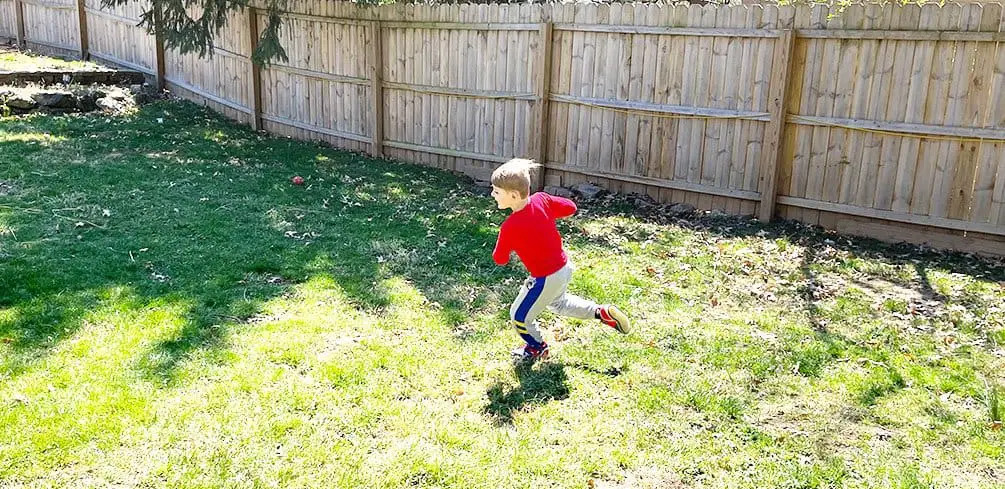
Children develop that outdoor play helps kids develop skills like imagination, creativity, and problem-solving. They also learn how to be independent in a safe environment which helps them develop independence skills when they are older.
Children get better physical health with outdoor play because it is the most natural way for kids’ bodies can move freely without being confined. Free play is described as a child-initiated play that is not organized or directed by an adult.
Children have a chance to develop skills like agility, balance, and coordination with outdoor play which helps them in their physical development while also having fun at the same time. Free Play can even be used as therapy for children who are recovering from injuries because it helps reduce pain without medication if done correctly.
Being outside while doing free play helps get one with nature and encourages children to develop a sense of responsibility. Kids are also more likely to have better mental health when they get enough outdoor play because it is an important and natural part of their development that helps with self-esteem and attention span.
Solitary play gives a strong sense of independence and also helps build a child’s confidence. The benefits of playing on playgrounds are many, but one major benefit is that it can be an inexpensive form of play to help kids to develop a strong sense of self.
Even More Benefits Of Playing
Playing has developmental benefits that allow kids to wind down at night and also allow for new cognitive and emotional skills. Some of the benefits include a feeling of competence, improved moods (especially if they are having difficulty with sleep), increased physical activity which can help to improve blood pressure levels in some cases as well as decrease obesity rates among children.
These are just some of the benefits that playing on a playground can provide for children, but there is still much more to explore and research in this area!
How Play Benefits Different Age Groups
There are many benefits to playing on playgrounds in different stages of your child’s life. There are many important differences in how 2-year-olds and 12-year-olds engage with the play. Something for every child to enjoy about going outside, no matter their age or developmental stage.
Not only do playgrounds help during childhood, but as children continue to grow into adults, they still find ways to utilize the features of a play area.
While children grow and change, parents need to remember that outdoor play is beneficial for them. A park is an important place for toddlers.
The one-year-old learns new skills on every visit, enjoying the bright sunshine, natural settings, and observing interesting creatures like birds in the trees around them.
Most children go through six stages of play according to their age. A great playground provides activities that are appropriate for each stage.
How Play Helps Infants
Within the first few months of a child’s life, they’re in an unoccupied play stage. Children learn all sorts of things when they play.
The seemingly random movements can help them better understand how the world around them works, paving the way for effective learning and building skills like social interaction and coordination
Many aspects of development start outside, and children are limited in what they can do when they are first born until 2 years old. This is the solitary play stage. Although they may be unfamiliar with other children, playtime allows their imaginations to develop and thrive.
When an infant plays alone they can learn many skills. Some of these are physical, cognitive, and social skills that help foster more independence and a better understanding of the world around them. Children are often left to explore on their own, letting them develop through a variety of senses.
How Play Helps Toddlers
Around two years old, you may notice your child observing other children playing at the park on their own while still preferring to play solo. This is called the “onlooker” phase. Kids love watching other kids play.
Watching someone else’s child build tunnels or make a sandcastle can feel like interacting with another person. They’ll make an effort to speak to the children they’re observing, but will rarely step in and join in those play sessions.
Parallel play allows children to play alongside others without a direct connection. Toddlers learn about the concept of “mine” through role-playing and playing with a particular toy.
At this time, parents of young toddlers will come to dread the word “again.” Repeated activities are a key part of the learning process, which is why kids need to do puzzles and play games over and over again.
How Play Helps Kids 3 – 11 Years Old
As your child gets older, he or she will become more interested in other kids than toys. Young kids like to engage in parallel play, during which they are allowed to use many toys and learn about coexisting.
It is also a stage of development known as an associative play that assists with skills such as language, motor coordination, memory, sensory awareness, and reasoning.
At this stage, children use the lessons they learned from earlier stages to play and interact with other players on their own or as a group play. Playing on a playground helps children learn to share and solve problems.
This is because of the challenges they have to overcome, like having to keep their balance while jumping over obstacles. There is no such thing as a formal organization to this type of play, although children often work toward similar goals. They want to play with the same toys and maybe even trade.
How Play Helps Kids 12 Years and Older
Free play is vitally important during the early school years. Learning to socialize is important for children, and play helps them develop social-emotional skills. Free play improves children’s thinking skills, problem-solving abilities, and physical activity strength.
This process is especially important for older kids and teenagers to help them grow into healthy adults. Fantasy play is how they explore new roles, complex emotions, and new vocabulary.
Older children play on a playground differently but still improve hand-eye coordination.
As kids grow up, their play may get more complex. As children grow, they find themselves playing more and thinking differently about their role in the playground.
Once they are old enough, your children will learn the basics of gameplay and the rules. In games like Simon Says, children learn that sometimes rules must be followed and other times exceptions are made.
Conclusion
As parents, we really need to set aside an hour or more a day to take our kids outside to a playground and enjoy some sunlight. If you are not near a community playground consider setting up a playground in your backyard.
If this isn’t an option just even taking your kids outside so they are able to play will be important research shows.
Please be careful and use at your own risk
None of the authors, contributors, administrators, or anyone else connected with BestPlaygroundSets, in any way whatsoever, can be responsible for your use of the information contained in or linked from these web pages.

